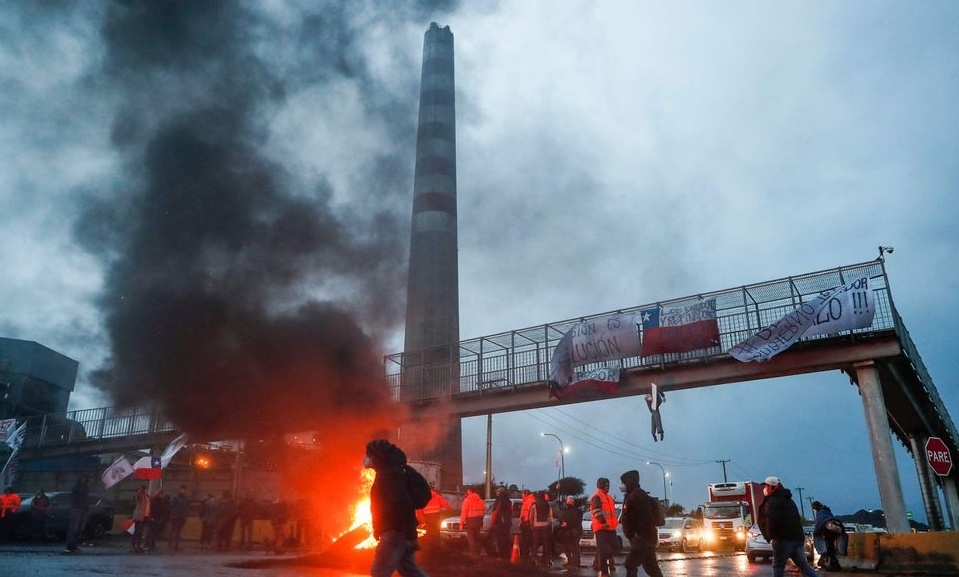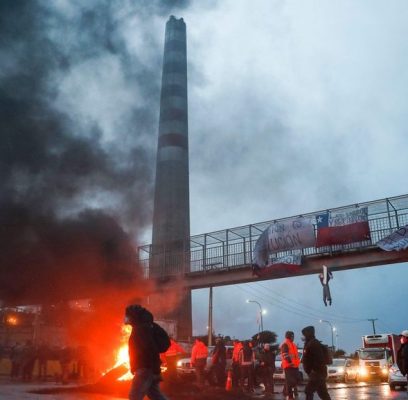In an extractivist country, the state copper company Codelco and the Government of Gabriel Boric put an end to years of poisoning episodes in the town of Quintero.
President Gabriel Boric, who is approaching four months in office, took days ago what is probably the biggest political decision of his government: he ordered the closure of the Codelco smelter, Ventanas – in the Quintero area, in the central zone of Chile–, after new episodes of intoxications to the population. With low popularity and no big projects to show, La Moneda and the new leaders of the state copper company made a complex decision, postponed by different administrations. It is a shift in the environmental policy of Chile, a country that lives from its natural resources, especially copper, in accordance with the Boric discourse of protecting the environment and people’s health. The decision will test the political skills of the left-wing Administration, which will have to approve the closure project in Congress and with the threat of the powerful Codelco unions, which this week paralyzed their work for 24 hours.
Gustavo Lagos, an academic from the Catholic University of Chile and one of the top specialists in mining, says that the announcement “is a clear shift in environmental policy and a wake-up call to those who believe that the screw should not be tightened again, which is very good”. “Everyone knows that they are under notice and that these things are going to be produced,” he analyzes, referring to the most demanding environmental standards for the industry. Lagos believes, however, that the closing of Ventanas does not imply a shift in the extractivist model of the South American country. “Chile does not know how to do anything more than extract forest and copper. And it will continue to do the same until we come up with the silver bullet of something that really works”, assures the researcher, one of the first to diagnose that the Codelco smelter had to close –years ago– and that a modern and higher capacity elsewhere.

The Environment Minister, Maisa Rojas, explained that this is an obvious signal: “The political message is very clear, and that is that Chile is embarking on a path of development that cannot continue to be at the expense of a nature that we need for our well-being.”
The Ventanas smelter opened in 1964 under the purview of the National Mining Company (Enami). Sixty years ago there were no other industries in Quintero, some 160 kilometers from Santiago de Chile, on the shores of the Pacific Ocean, in the Valparaíso region. But currently there are 16 large companies in the industrial pole, in a municipality where some 32,000 inhabitants reside. The environmental problems began in the early 1990s and in 2005, during the Ricardo Lagos government, the state decided to transfer Windows to Codelco, the state copper company, which has always lost money in this operation. Over the years, the demands for the emission of sulfur dioxide, particulate matter and arsenic increased.
Poisoning crises began to become common. In 2011, for example, nine adults and 33 minors were intoxicated in a school. Those affected suffered breathing difficulties, cough, nausea, fainting, irritation of the respiratory system, vomiting and abdominal pain. A new crisis occurred in 2018.
Among the 16 companies that make up the industrial hub, there are some associated with energy –fuels or gas, for example–, foundries and refineries, ports, which emit different gases and compounds into the air. Adverse weather conditions predominate around 33% of the days of the year, especially in winter, because the thermal inversion does not allow the gases to disperse and, therefore, they are contained at low altitude. This favors the concentration of gases in the environment, potentially causing new intoxications. Those affected are mainly children and older adults.
This was what happened at the beginning of last June when, despite all the regulatory restrictions and the investments made by Codelco, there were consecutive environmental crises in the area. A hundred people were affected, including members of school communities. The new president of the board of directors of the copper company, Máximo Pacheco – a socialist, who was Minister of Energy in the second government of Michelle Bachelet – began to hasten the decision postponed by different administrations.
On Friday, June 17, it was reported that the board of directors had resolved the gradual closure and Boric, from La Moneda, that same night justified the decision: “I want you to know that each of the actions that we are carrying out are carried out looking at the well-being of all citizens, and especially women, men, boys and girls who experience more directly the consequences of an economic and social model that has been exclusive, that has been unequal, and that expresses itself in various ways, one of the which is the persistence of the sacrificial zones. And we have said it very clearly: we do not want more sacrifice zones,” said the president, referring to those inhabited places that suffer from contamination due to the industries that support their own local economy.
To the 350 Codelco workers who work in Ventanas, who that same day showed their strong dissatisfaction, Boric promised them a relocation, reconversion or exit plan. The unions, however, made an attempt to show strength last Wednesday with a general strike at different Codelco plants in the country, which they lifted the following day. Finally, they were willing to work together with the administration of Codelco and the Government in the processing of the bill that, if approved, will allow the closure of Ventanas in a period of one year.
Success, in any case, is not assured. The forces that support Boric – the alliance between the Communist Party and the Broad Front plus the socialist world – have not been unconditional to the president in Congress, where some pro-government parliamentarians have already expressed their criticism of the way in which the decision was made. , to the letter and without a previously negotiated plan with the workers. On the other hand, the impact on the economy is uncertain, because after what happened at Ventanas – a small smelter – Minister Rojas announced that the other companies in the Quintero industrial area “are going to leave” (because not only is Ventanas the polluter , although the main one is in sulfur dioxide).
Nor is it clear what will happen to other mining areas that produce contamination with an impact on the population. Everything, with an inflation scenario that reaches 11.5% per year, the threat of recession by 2023 and a proposed Constitution with a strong green seal, in a country with a stagnant export structure.
